10 Electronic Data Capture Systems for Streamlined Clinical Trials

Overview
This article identifies ten electronic data capture (EDC) systems that significantly enhance the efficiency of clinical trials. Each system is distinguished by its unique features, compliance with regulatory standards, and capability to streamline data management processes. These attributes collectively underscore the growing importance of EDC solutions in optimizing clinical research and reducing costs. By addressing compliance challenges through these innovative systems, the article not only highlights their effectiveness but also emphasizes the necessity for organizations to adopt such technologies to remain competitive in the evolving landscape of clinical trials.
Introduction
The landscape of clinical trials is rapidly evolving, and electronic data capture (EDC) systems have emerged as pivotal tools in enhancing efficiency and compliance. As the demand for streamlined data management grows, these systems present researchers and organizations with the opportunity to optimize processes, reduce costs, and improve the integrity of collected data. However, with numerous options available, determining which EDC system best suits specific needs and objectives can be challenging. This article delves into ten leading electronic data capture systems, exploring their unique features and benefits that can significantly transform the clinical trial experience.
AVS Life Sciences: Comprehensive EDC Solutions for Clinical Trials
AVS Life Sciences offers comprehensive electronic data capture systems that are specifically designed for clinical studies. By prioritizing regulatory adherence and quality control, AVS Life Sciences empowers clients to navigate the complexities of information collection and management. Their electronic data capture systems are specifically designed to meet the unique needs of pharmaceutical and biotechnology firms, ensuring information integrity and compliance with throughout the study process.
Leveraging their expertise, AVS Life Sciences helps clients optimize clinical trials by utilizing electronic data capture systems, reducing costs by as much as 30%—a statistic supported by studies indicating that this reduction can be achieved while enhancing accuracy. Electronic data capture systems significantly enhance information integrity and quality by reducing human errors associated with manual entry, ultimately leading to faster regulatory approvals and market access.
As the electronic data capture systems market is projected to expand at a CAGR of 12.5% from 2025 to 2025, the necessity of adopting electronic data capture systems becomes increasingly evident. AVS Life Sciences is at the forefront of this trend, guiding clients through complexities while ensuring compliance with evolving regulatory standards.
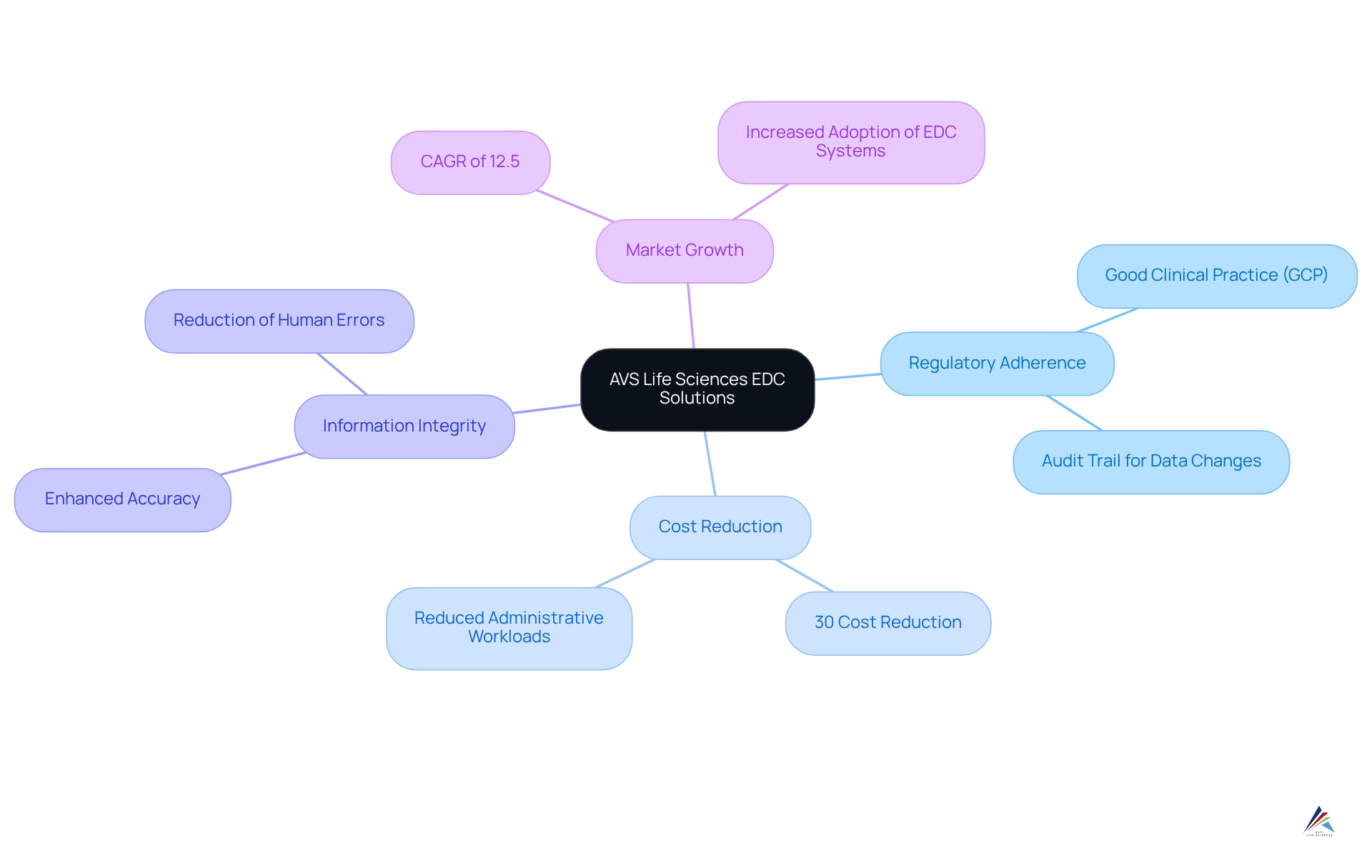
Medidata Rave EDC: Streamlined Data Management for Clinical Trials
Medidata Rave EDC stands out as a premier choice for optimizing information management in research studies through electronic data capture systems. This cloud-based platform provides a comprehensive suite of electronic data capture systems that facilitate real-time information capture, monitoring, and reporting, thereby significantly enhancing operational efficiency. Its intuitive interface, paired with advanced analytics capabilities, empowers researchers to make swift, informed decisions.
Designed to support complex study designs, electronic data capture systems like Medidata Rave seamlessly integrate with various management systems for research, ensuring a smooth flow of information while adhering to stringent regulatory standards. With over 700,000 certified site users and having assisted 11 million patients in research studies, Rave EDC is recognized as the , supporting more than 36,000 studies across diverse therapeutic areas. This extensive user base underscores its reliability and effectiveness in improving information management processes, ultimately facilitating quicker approvals for research studies.
Moreover, the integration of electronic data capture systems with platforms like RTSM, CTMS, and eCOA is essential for effective scaling, ensuring that data management remains efficient and compliant. Medidata Rave EDC is also acknowledged as the most recently utilized electronic data capture systems within the industry, further solidifying its popularity and trust among users.
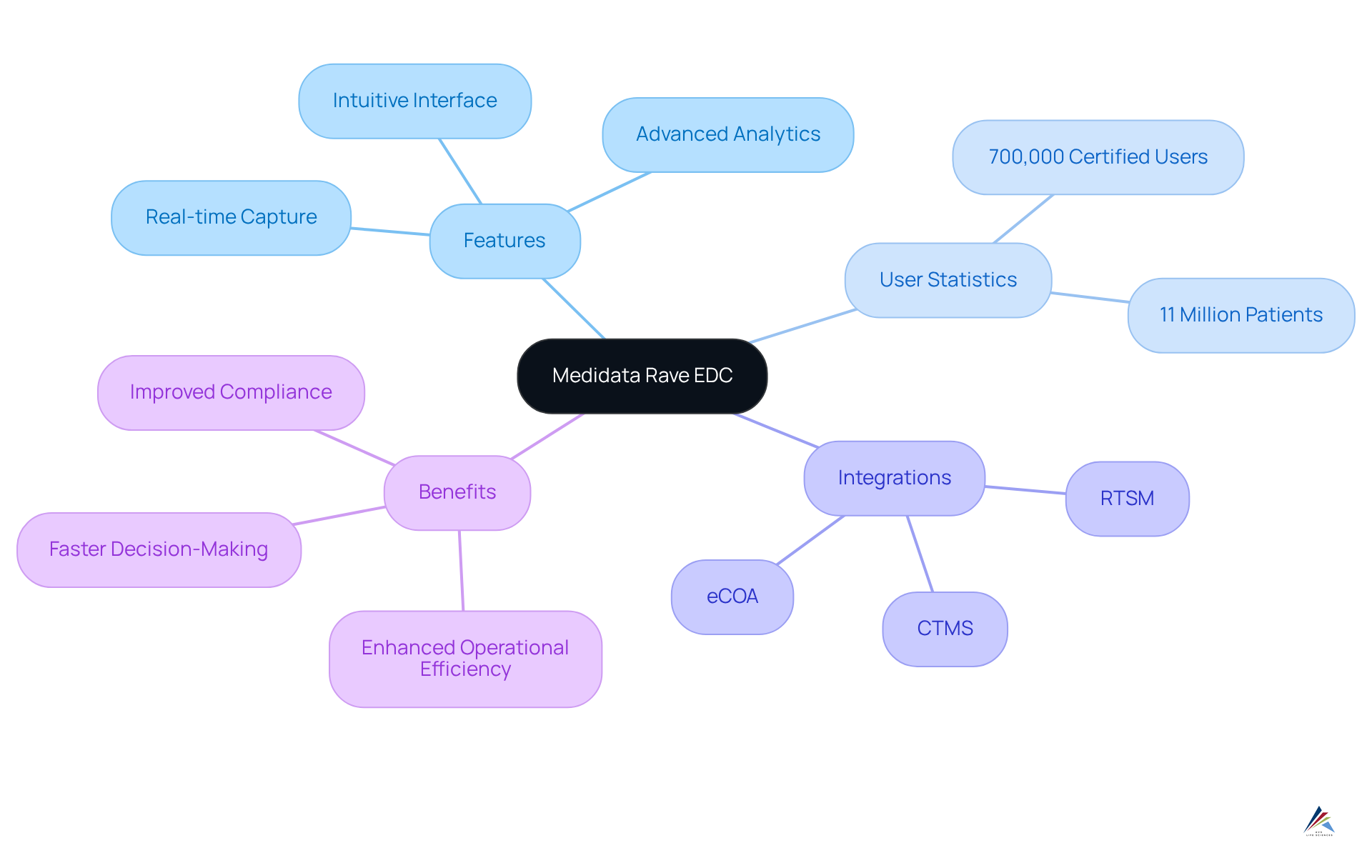
OpenClinica: Flexible Open-Source EDC for Diverse Trials
OpenClinica stands as a premier open-source platform for electronic data capture systems, offering unparalleled flexibility and customization tailored for clinical studies. Its modular design empowers organizations to adapt the system to their specific requirements, making it suitable for a wide array of testing types, ranging from academic research to extensive pharmaceutical trials. OpenClinica streamlines information collection through electronic data capture systems using (eCRFs) and provides robust tools for validation and monitoring. Furthermore, its open-source nature cultivates community collaboration, driving continuous improvement and innovation within the platform, ultimately enhancing the effectiveness of clinical research.
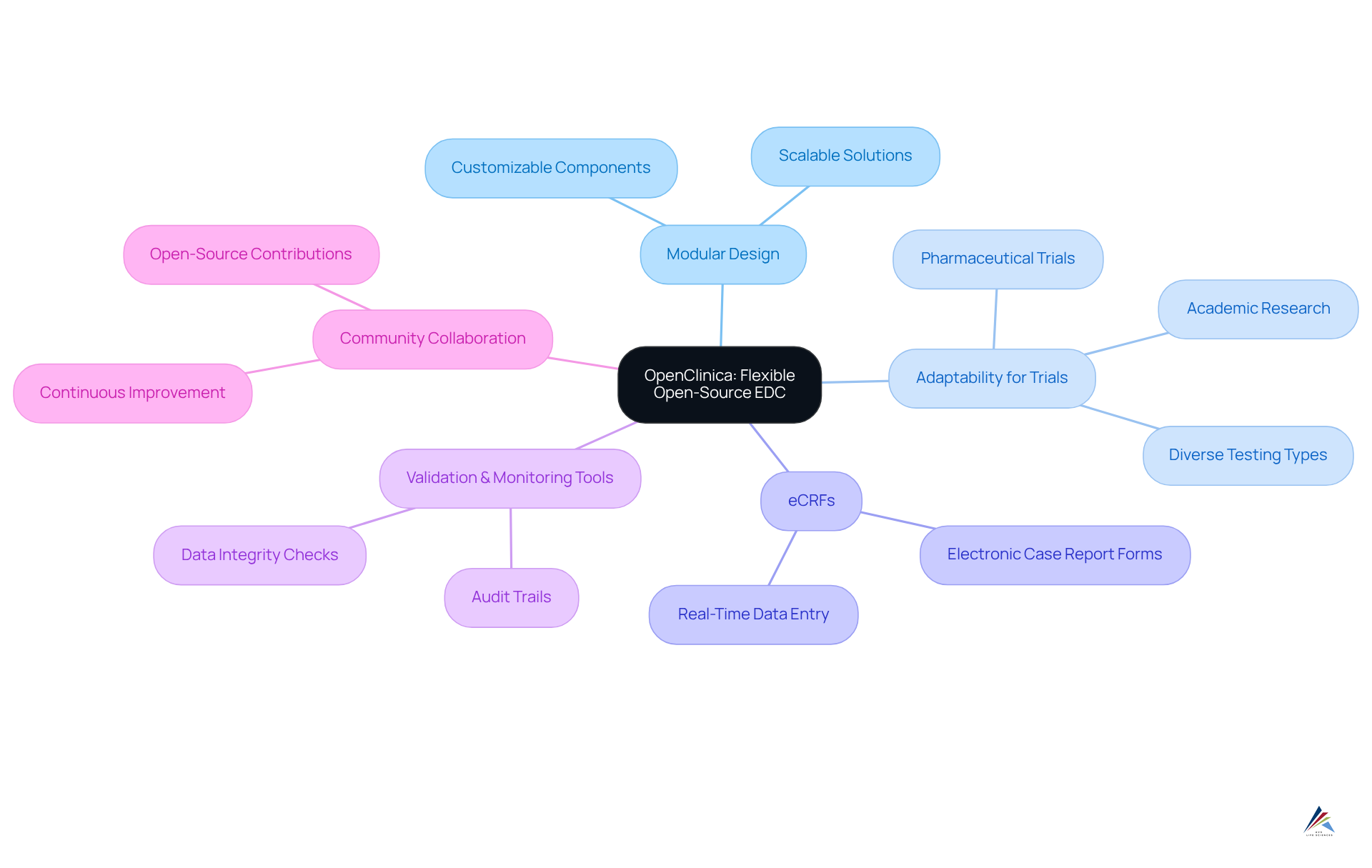
Veeva Vault EDC: Integrated Data Solutions for Enhanced Compliance
Veeva Vault EDC leverages electronic data capture systems to tackle the pressing compliance challenges faced by organizations in clinical trials by providing integrated information solutions that significantly improve compliance and simplify processes. This cloud-based platform enhances the use of electronic data capture systems to facilitate seamless information capture, management, and reporting within a unified ecosystem. Key features, such as automated workflows, real-time information access, and comprehensive audit trails, are meticulously designed to ensure adherence to regulatory standards. Moreover, the platform's integration with other Veeva applications enhances its effectiveness, making it a preferred choice for organizations aiming to optimize trial operations.
Notably, GSK reported a remarkable 30 to 35% enhancement in study build timelines following the adoption of Veeva Vault EDC, underscoring its critical role in accelerating research information management. Furthermore, Veeva CDB has efficiently managed information for over 200 studies and refined records for more than 200,000 subjects, demonstrating its capability to handle complex requirements adeptly. Veeva CDB also enables clients to necessary to aggregate, clean, and transform research information, thereby enhancing overall productivity.
This level of integration not only simplifies collaboration with study partners and information providers but also boosts overall productivity, establishing electronic data capture systems like Veeva Vault EDC as an indispensable tool for modern clinical trials. As the adoption of Veeva Vault EDC continues to rise among leading pharmaceutical companies, its relevance in the industry is increasingly acknowledged.
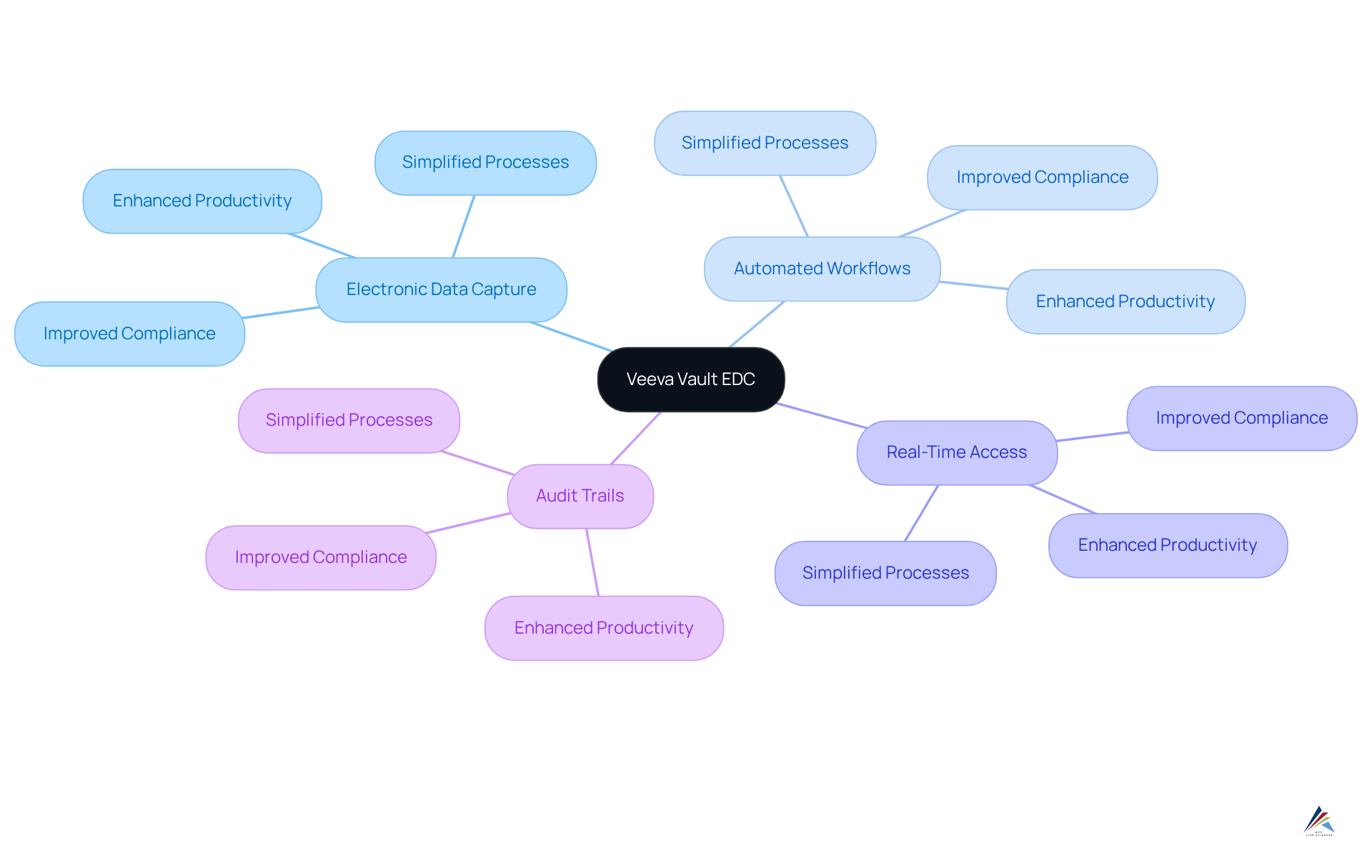
Castor EDC: User-Friendly Data Collection for Researchers
Castor EDC is meticulously crafted for researchers, showcasing a user-friendly interface that streamlines information collection and management. This platform facilitates the seamless creation of electronic case report forms (eCRFs) and accommodates diverse information types, including images and questionnaires. Its intuitive design significantly diminishes the learning curve for new users, promoting quicker onboarding and efficient data entry.
Furthermore, Castor EDC adheres to Good Clinical Practice (GCP) and other regulatory standards, establishing itself as a dependable choice for clinical trials. Recent evaluations reveal that Castor's ePRO system ranks second overall in user satisfaction, underscoring its effectiveness in enhancing information quality and compliance rates.
As projections indicate that over half of all clinical outcome assessments will originate from patients within the next two years, the necessity for user-friendly systems like Castor EDC is increasingly critical. Researchers have praised the platform for its robust technical support and adaptability, essential for managing experimental information effectively.
Additionally, the Castor for Impact Program exemplifies the company's dedication to advancing health equity and supporting research in underserved communities. As Dr. Derk Arts, CEO of Castor, articulated, 'Castor for Impact extends our commitment to accessible, evidence-based medicine.' This initiative not only reduces barriers to entry for vital research projects but also emphasizes the importance of maintaining through rigorous procedures in managing discrepancies.
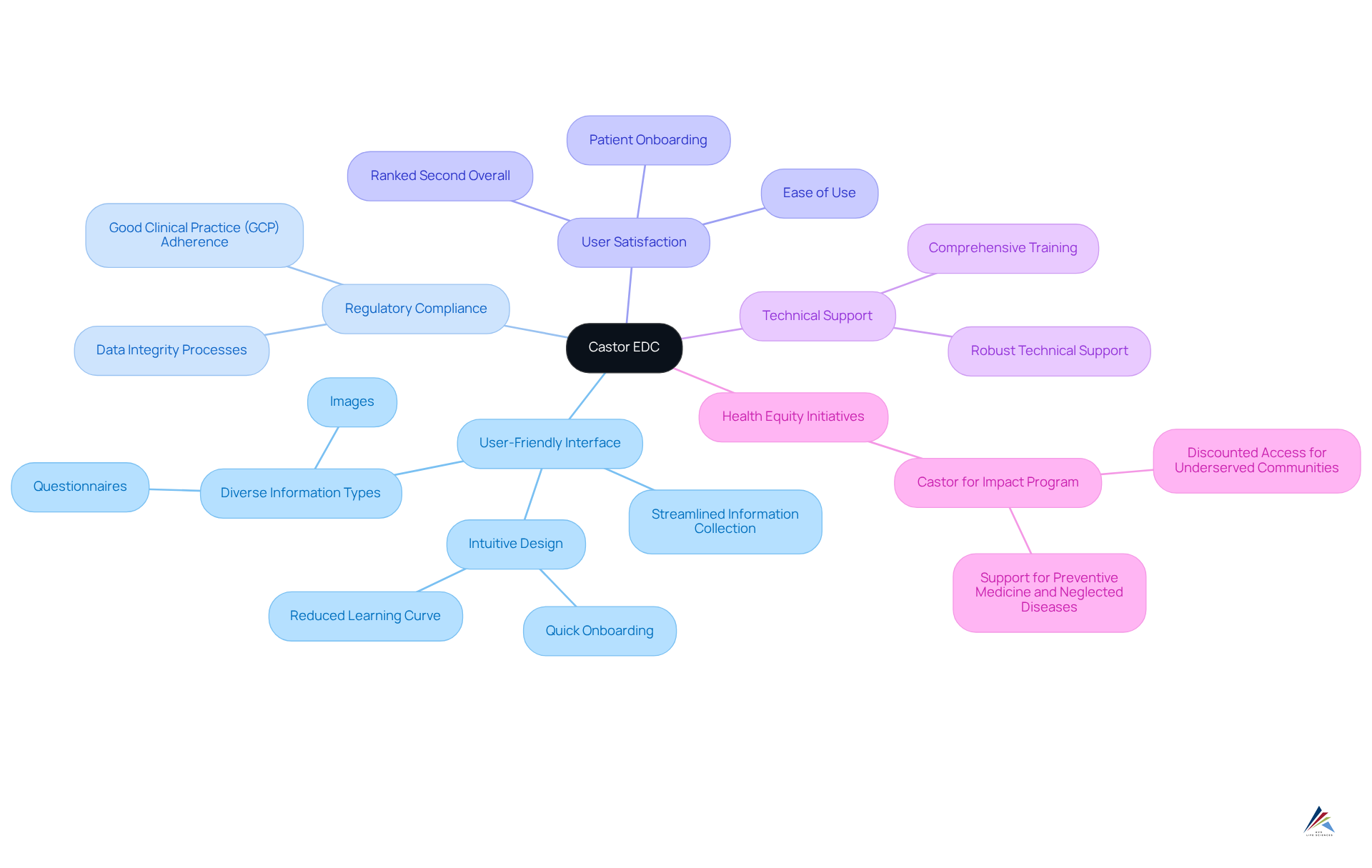
Medrio: Cloud-Based EDC for Accelerated Clinical Trials
Medrio presents a robust cloud-based electronic data capture systems solution that significantly accelerates clinical studies by optimizing information collection and management processes. This platform is particularly beneficial for small to mid-sized organizations striving to reduce costs and hasten their time-to-market. Notable features of Medrio encompass:
- Customizable electronic Case Report Forms (eCRFs)
- Real-time information access
- Integrated compliance checks, which guarantee that all collected data complies with rigorous regulatory standards
The cloud infrastructure facilitates seamless collaboration among stakeholders, thereby enhancing overall efficiency. With the at a compound annual growth rate of 14.6% from 2023 to 2030, Medrio's innovative approach establishes it as a leader in meeting the evolving demands of clinical research.
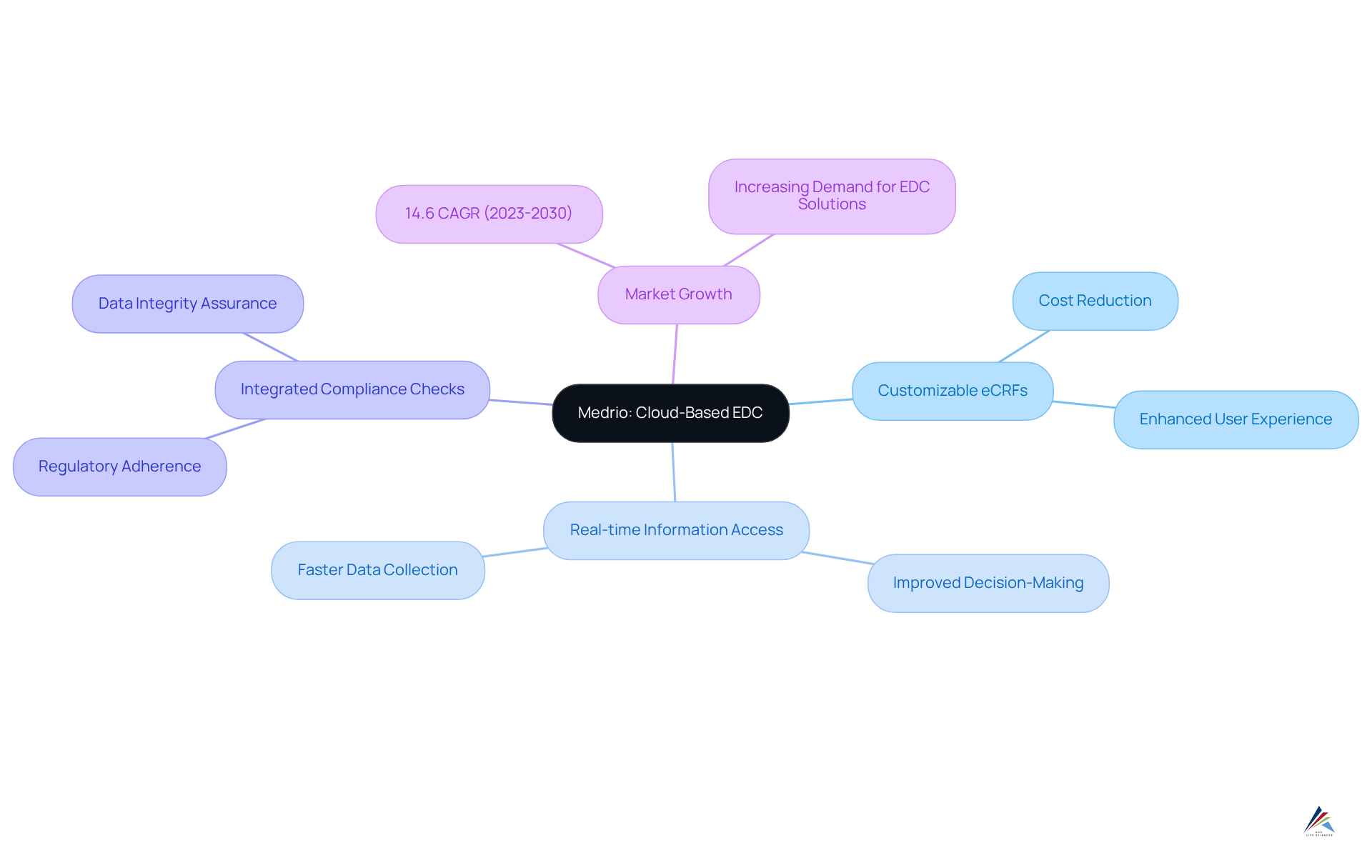
ClinCapture: Affordable EDC for Small Trials and Startups
ClinCapture emerges as a cost-effective electronic data capture (EDC) solution tailored for small trials and startups. This platform offers essential features for efficient information gathering and management, alleviating the financial burden often associated with larger EDC systems. ClinCapture facilitates customizable electronic case report forms (eCRFs) and provides robust tools for validation and monitoring, enabling budget-conscious organizations to uphold compliance with regulatory standards. Its user-friendly interface promotes swift onboarding for teams, making it an appealing option for burgeoning companies in the life sciences sector.
With an expanding user base, ClinCapture is increasingly recognized for its ability to while ensuring the integrity of high-quality information. Notably, the global electronic information collection market is projected to reach USD 4.7 billion by 2032, underscoring the growing importance of EDC solutions in research studies. ClinCapture's collaboration with MediciNova for COVID-19 research illustrates its relevance and adaptability in supporting vital research initiatives.
As Scott Weidley, CEO of ClinCapture, remarked, "We are excited to support MediciNova in this critical research.
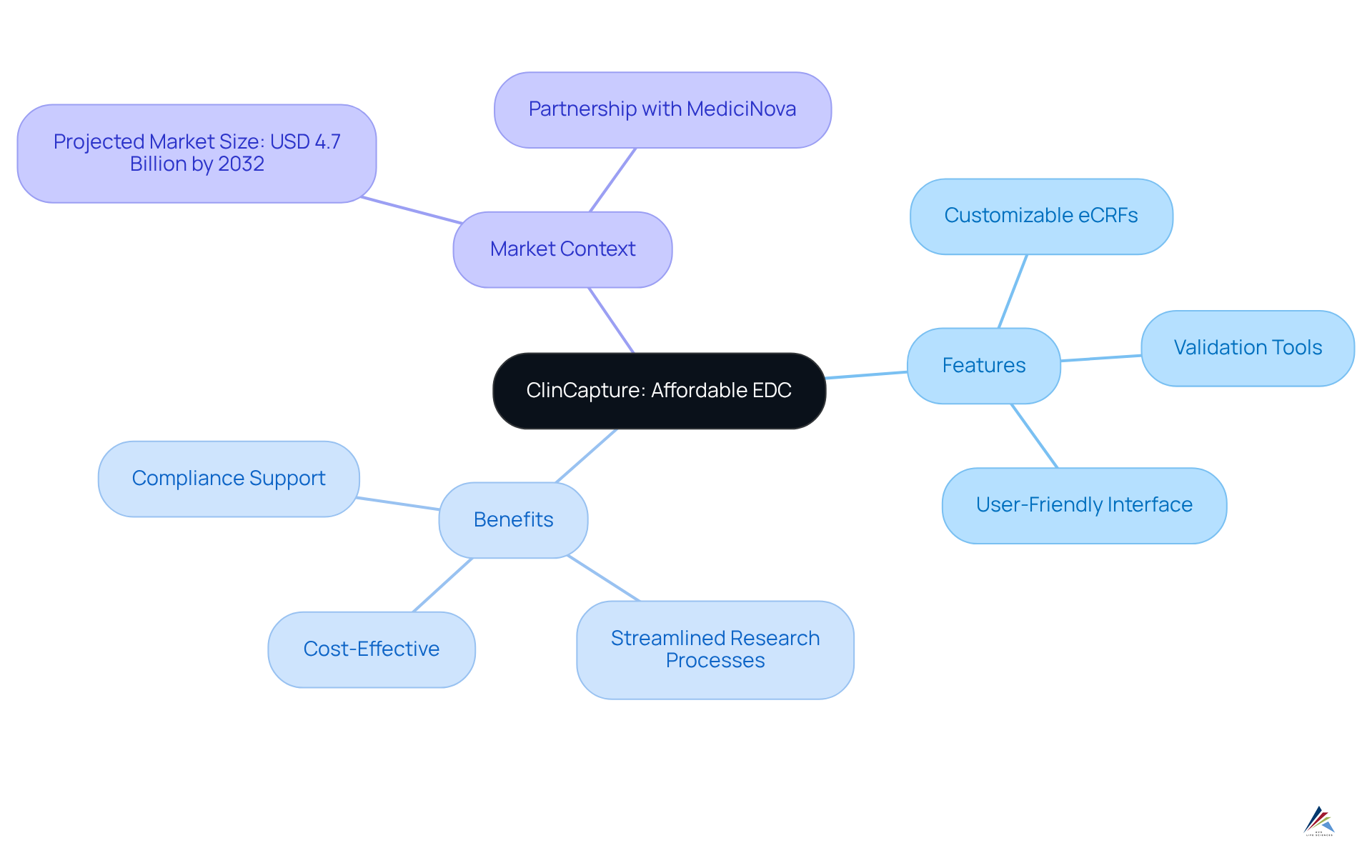
Oracle Siebel CTMS: Comprehensive EDC and CTMS Integration
Oracle Siebel CTMS stands out as a comprehensive solution that seamlessly integrates electronic information capture with management systems for research studies. This integration facilitates a fluid information exchange between experimentation management and information gathering processes, significantly enhancing . The platform is equipped with advanced tools for information monitoring, reporting, and compliance management, ensuring that every aspect of the research meets rigorous [regulatory standards](https://oracle.com/news/announcement/oracle-recognized-as-a-leader-in-everest-group-peak-matrix-for-life-sciences-cctms-2025-02-03). Its robust features make it particularly well-suited for large-scale experiments that demand meticulous [information management and oversight](https://intuitionlabs.ai/articles/oracle-in-life-sciences). Recent enhancements to Oracle Siebel CTMS further augment its capabilities, providing users with innovative features that streamline research processes and bolster information integrity. As the [clinical research landscape](https://novotech-cro.com/news/novotech-selects-oracles-siebel-clinical-trial-management-system-support-continued-growth) continues to evolve, the necessity for thorough EDC and CTMS solutions like Oracle Siebel becomes increasingly apparent, empowering organizations to adeptly navigate the complexities of modern trials.
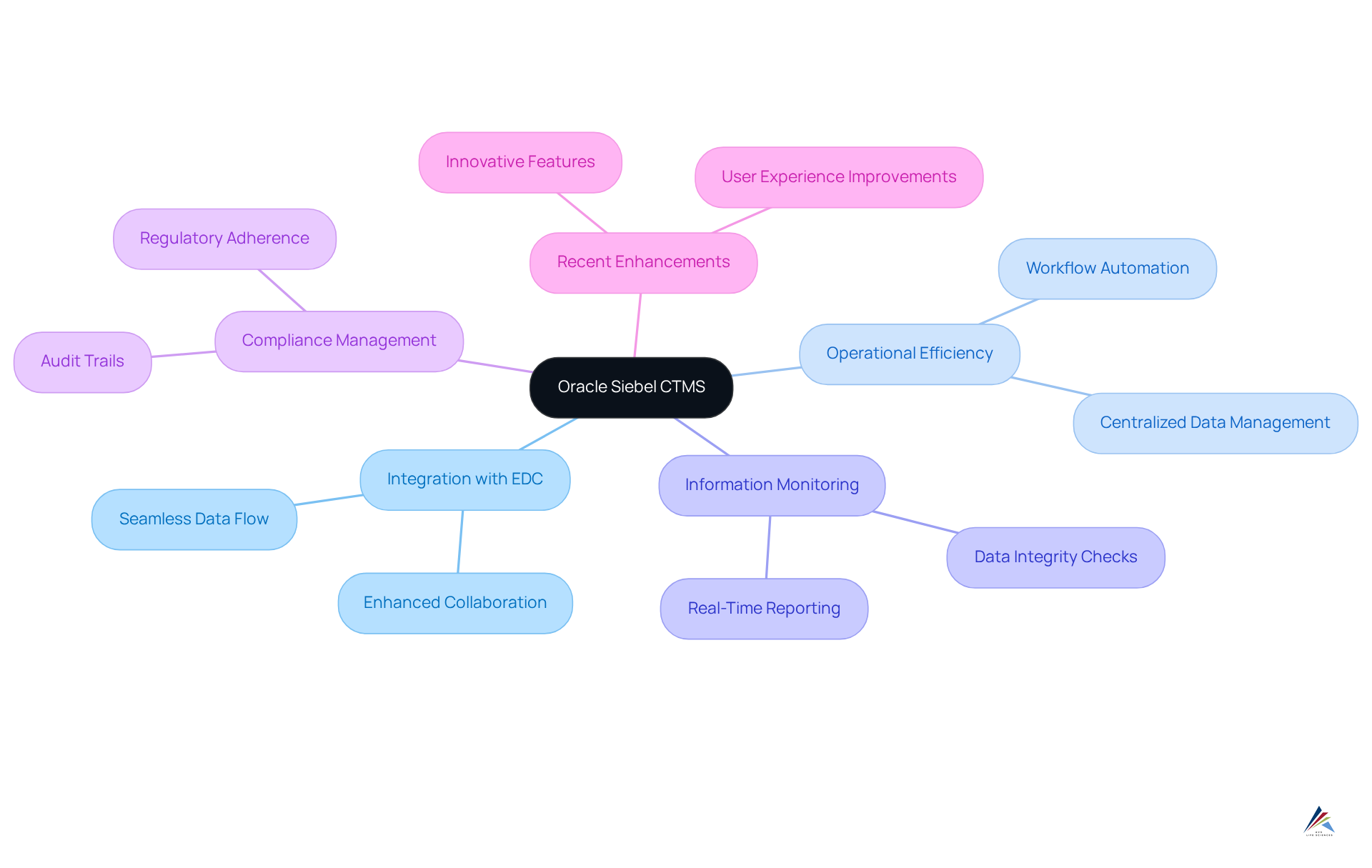
REDCap: Secure Data Capture for Academic Research
REDCap stands as a secure electronic data capture system, extensively employed in academic research. This platform features a that facilitates the creation and management of databases and surveys, making it an ideal choice for researchers across diverse fields. By ensuring data security and adherence to regulatory standards, REDCap empowers researchers to concentrate on their studies, alleviating concerns over data integrity. Its remarkable adaptability and simplicity have established it as a preferred option among educational organizations undertaking research studies and various projects.
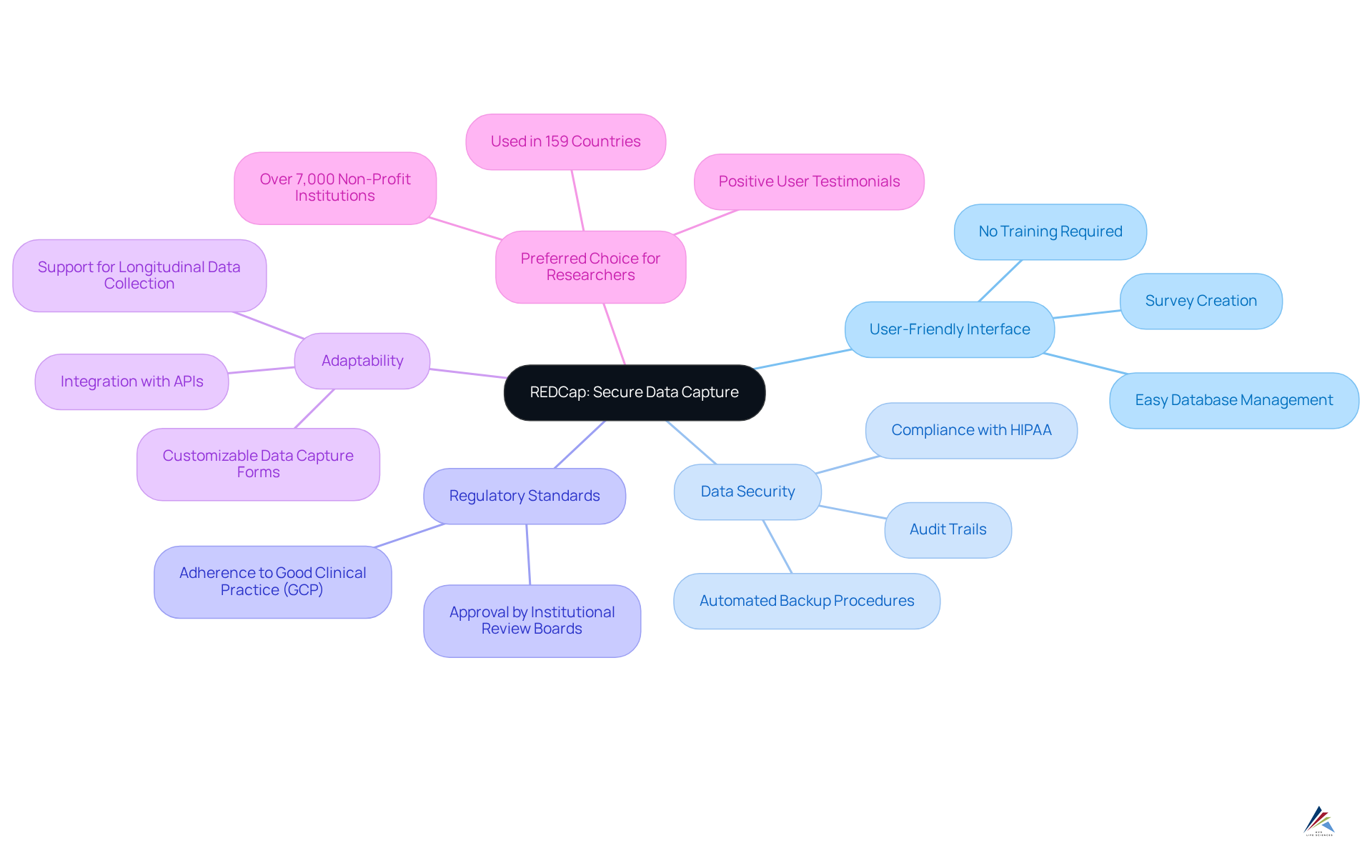
eClinical Solutions elluminate: Advanced Analytics for EDC
eClinical Solutions elluminate stands out as a sophisticated platform for , offering robust analytics functionalities tailored for clinical studies. This system empowers organizations to extract real-time insights from their data, thereby facilitating informed decision-making throughout the trial process.
With features including:
- Information visualization
- Predictive analytics
- Comprehensive reporting tools
elluminate not only enhances quality but also ensures compliance with regulatory standards. Notably, the global market for electronic data capture is projected to grow from approximately USD 1.7 billion in 2022 to USD 4.7 billion by 2032, driven by the increasing demand for effective data management in medical research.
As organizations increasingly embrace electronic data capture systems, especially in regions like Asia Pacific, the focus on analytics becomes crucial for enhancing research performance. However, challenges such as technical issues and the necessity for robust training for end-users persist within the EDC landscape.
As the industry transitions toward data-driven methodologies, elluminate's emphasis on analytics positions it as an indispensable tool for enhancing operational efficiency and ensuring compliance in research studies. The U.S. Food and Drug Administration (FDA) highlights that the complexity of clinical trials demands electronic data capture systems that can efficiently manage detailed data points, further accentuating the critical role of advanced analytics in these systems.
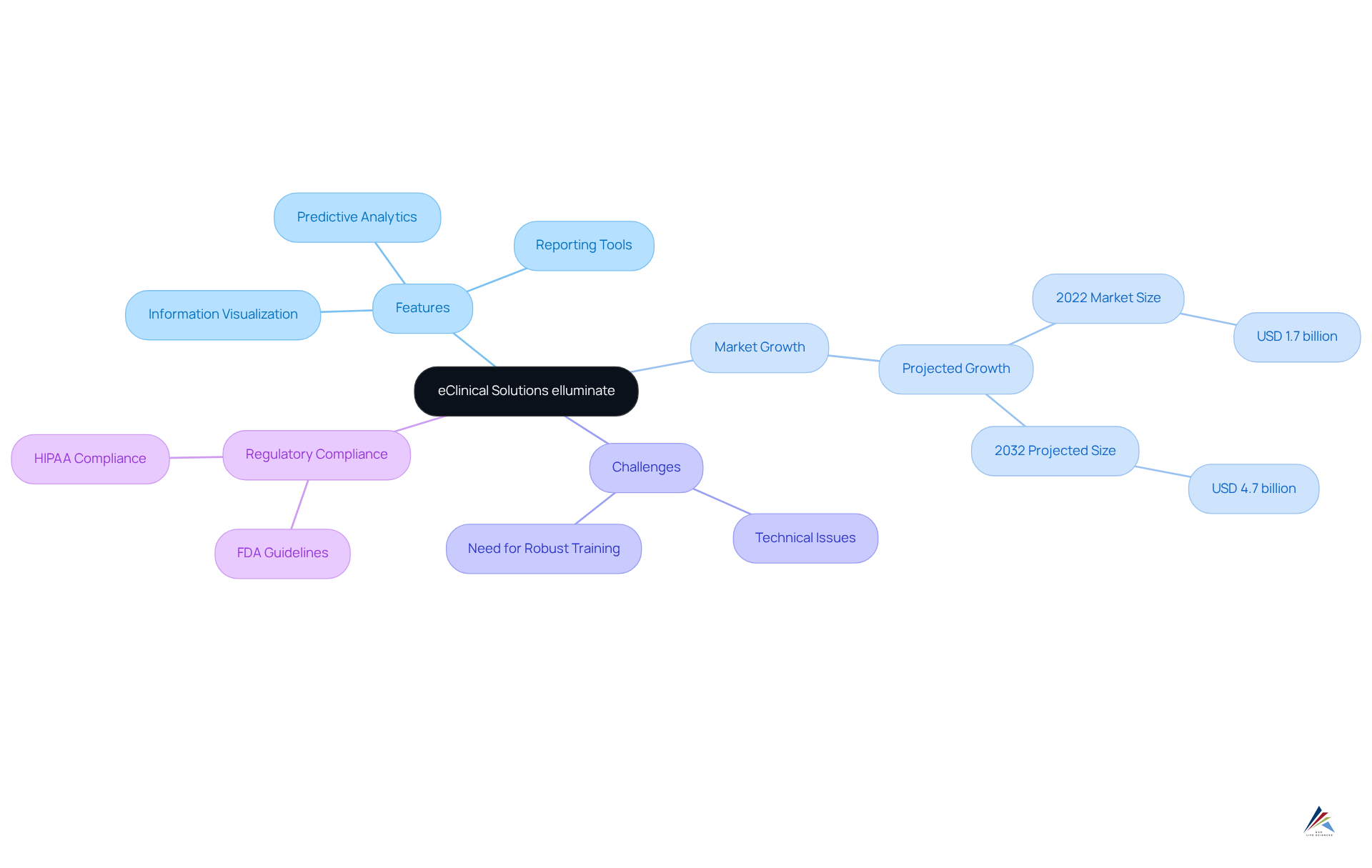
Conclusion
The exploration of electronic data capture (EDC) systems underscores their critical role in enhancing the efficiency and accuracy of clinical trials. By adopting these innovative solutions, organizations can streamline data management processes, ensuring compliance with regulatory standards and ultimately accelerating the path to market for new treatments.
Key insights from the article illuminate the diverse offerings of leading EDC systems, including:
- AVS Life Sciences
- Medidata Rave
- OpenClinica
- Veeva Vault
Each platform presents unique features tailored to various organizational needs, ranging from user-friendly interfaces to advanced analytics capabilities. The advantages of these systems extend beyond mere data collection; they encompass improved information integrity, reduced costs, and enhanced operational efficiency, all of which are vital in the fast-paced realm of clinical research.
As the demand for effective data management continues to escalate, embracing electronic data capture systems becomes increasingly essential for organizations striving to remain competitive. The projected growth of the EDC market highlights the significance of these tools in driving successful clinical trials. By investing in the right EDC solutions, stakeholders can not only enhance their research outcomes but also contribute to the advancement of medical science, ultimately benefiting patients worldwide.
Frequently Asked Questions
What is AVS Life Sciences known for?
AVS Life Sciences offers comprehensive electronic data capture systems specifically designed for clinical studies, focusing on regulatory adherence and quality control.
How do AVS Life Sciences' electronic data capture systems benefit clients?
These systems help clients optimize clinical trials by reducing costs by up to 30%, enhancing accuracy, and improving information integrity, which leads to faster regulatory approvals and market access.
What is the projected growth rate of the electronic data capture systems market?
The electronic data capture systems market is projected to expand at a compound annual growth rate (CAGR) of 12.5% from 2025 to 2025.
What is Medidata Rave EDC and its primary function?
Medidata Rave EDC is a cloud-based platform that optimizes information management in research studies through electronic data capture systems, facilitating real-time information capture, monitoring, and reporting.
How does Medidata Rave EDC enhance operational efficiency?
It features an intuitive interface and advanced analytics capabilities that empower researchers to make swift, informed decisions, improving the overall efficiency of data management.
What distinguishes Medidata Rave EDC in the industry?
Medidata Rave EDC is recognized as the gold standard in electronic data capture systems, with over 700,000 certified site users and support for more than 36,000 studies across various therapeutic areas.
Why is integration with other platforms important for Medidata Rave EDC?
Integration with platforms like RTSM, CTMS, and eCOA is essential for effective scaling and ensures that data management remains efficient and compliant.
What is OpenClinica and its key features?
OpenClinica is a premier open-source platform for electronic data capture systems that offers flexibility and customization for clinical studies, suitable for various testing types.
How does OpenClinica facilitate information collection?
OpenClinica streamlines information collection through electronic case report forms (eCRFs) and provides robust tools for validation and monitoring.
What is the advantage of OpenClinica's open-source nature?
Its open-source nature fosters community collaboration, driving continuous improvement and innovation within the platform, which enhances the effectiveness of clinical research.
